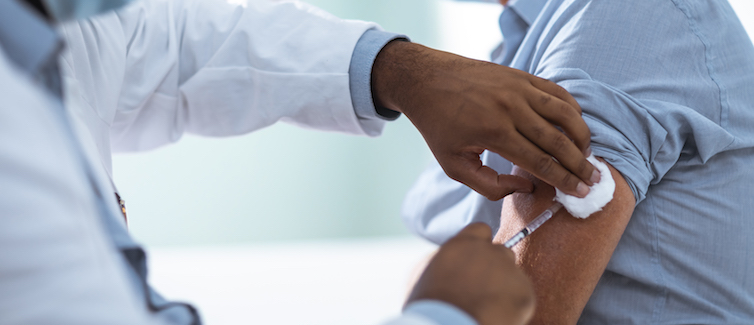Disclaimer: At UPMC HealthBeat, we strive to provide the most up-to-date facts in our stories when we publish them. We also make updates to our content as information changes. However, education about COVID-19 can shift quickly based on new data, emerging variants, or other factors. The information in this story was accurate as of its publish date. We also encourage you to visit other reliable websites for updated information, including the Centers for Disease Control and Prevention (CDC), Food and Drug Administration (FDA), and your state and local governments.
More than 150 million Americans have received at least one of the four COVID-19 vaccines available in the United States. Most now have strong protection against the novel coronavirus.
But people with transplanted organs who get vaccinated have less protection from COVID-19 than the average person. A recent study suggests under half of all organ transplant recipients have little or no protection against COVID-19 after receiving the vaccine.
Never Miss a Beat!
Subscribe to Our HealthBeat Newsletter!
Thank you for subscribing!
You can now select the specific newsletters you'd like to receive.
You are already subscribed.
Subscribe to more newsletters in our email preference center.
Sorry, an error occurred. Please try again later.
Get Healthy Tips Sent to Your Phone!
Understanding Organ Transplants and COVID-19 Trials
Organ transplant recipients take medicines for the rest of their lives to prevent rejection. The medicines weaken the immune system so it doesn’t attack the new organ. But a weaker immune system has a harder time fighting off new infections or mounting a response to vaccines.
Clinical trials for COVID-19 vaccines did not include adult organ transplant patients. That means no data from the trials exists about how well the vaccines work in this group.
About 39,000 organ transplants took place in 2020. Hundreds of thousands of organ transplant recipients live in the U.S.
Scientists are now studying organ transplant recipients who get the COVID-19 vaccine. Their goal is to learn how well the vaccine works for them.
New Study Offers Some Answers
A recent study in JAMA reported on 658 organ transplant recipients who received both doses of either the Moderna or Pfizer-BioNTech COVID-19 vaccines. Both vaccines are mRNA vaccines. The study did not look at the Johnson & Johnson/Janssen vaccine.
Three weeks after getting the first dose, about 1 in 7 people (15%) had antibodies to the coronavirus. Antibodies are the immune system’s way of fighting disease. A month after receiving the second vaccine dose, just over half of the organ transplant recipients (54%) had antibodies to the virus.
This means 46% of organ transplant recipients who received both doses of an mRNA vaccine did not have antibodies. Researchers do not yet know if these people have protection against COVID-19.
People in the study who did have antibodies often had fewer antibodies than people with working immune systems. Scientists do not yet how many antibodies are necessary to protect against COVID-19. So they don’t know how strong protection against COVID-19 is for organ transplant recipients.
What to Do If You’re an Organ Transplant Recipient
People who have transplanted organs may have little or no protection against COVID-19 after vaccination.
Immunocompromised patients — such as solid organ transplant recipients — who received the Pfizer-BioNTech or Moderna vaccines are eligible for an additional dose of those vaccines. They can get the additional dose 28 days after their second dose. If you are immunocompromised and wish to schedule an appointment to receive an additional dose of the vaccine at UPMC, visit Vaccine.UPMC.com or call 844-876-2822 between 8 a.m. and 5 p.m., Monday through Friday.
In addition to an additional dose of vaccine, experts say organ transplant patients still should use precautions to reduce their risk of COVID-19. That includes wearing a mask in public, keeping social distance in public, and avoiding large gatherings.
The Centers for Disease Control and Prevention (CDC) recommends that vaccinated people do not need to wear masks around others. But organ transplant recipients should wear masks if they don’t know the vaccine status of others around them. Then they have more protection near an unmasked person who is unvaccinated.
In these situations, people with transplanted organs may want to wear an N95 or KN95 mask that fits well. These masks filter out more virus particles than cloth masks. If an N95 mask is not available, wearing surgical masks or two masks together offers more protection than cloth masks.
The study co-author, Dorry Segev, MD, PhD, spoke to NPR about his research. “One of the things that we’re really trying to emphasize to the transplant population is, vaccination does not mean immunity,” he said.
Scientists continue to research the response to COVID-19 vaccines in organ transplant recipients.
Editor's Note: This article was originally published on , and was last reviewed on .
Sources
Brian J. Boyarsky, William A. Werbel, Robin K. Avery, Aaron A. R. Tobian, and others. Antibody Response to 2-Dose SARS-CoV-2 mRNA Vaccine Series in Solid Organ Transplant Recipients. JAMA. Link
COVID Data Tracker. Centers for Disease Control and Prevention. Link
Maria Godoy. Vaccination Against COVID 'Does Not Mean Immunity' For People With Organ Transplants. NPR. Link
Organ Donation Statistics. U.S. Government Information on Organ Donation and Transplantation. Health Resources and Services Administration. Link
About UPMC
Headquartered in Pittsburgh, UPMC is a world-renowned health care provider and insurer. We operate 40 hospitals and 800 doctors’ offices and outpatient centers, with locations throughout Pennsylvania, Maryland, New York, West Virginia, and internationally. We employ 4,900 physicians, and we are leaders in clinical care, groundbreaking research, and treatment breakthroughs. U.S. News & World Report consistently ranks UPMC Presbyterian Shadyside as one of the nation’s best hospitals in many specialties and ranks UPMC Children’s Hospital of Pittsburgh on its Honor Roll of America’s Best Children’s Hospitals. We are dedicated to providing Life Changing Medicine to our communities.
